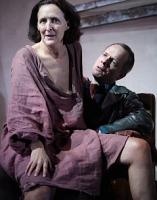Review - 'Scenes From An Execution' at the National Theatre
First performed on radio back in 1985, 'Scenes from An Execution' presents a mixture of fact and fiction. The factual element is encapsulated in the Battle of Lepanto, a staggeringly horrific sea battle between Turks and Christians which took place in 1571. The fictional element is that the Doge of Venice has decided to commemorate this infamous victory of the Christian Holy League with a painting by a female painter, Galactia, played by Fiona Shaw.
A narrator - here called The Sketchbook - is housed, for most of his time on stage, in a white box which descends precariously from high up in the ceiling. At first, I thought this was a video projection, until the box came a little closer towards the front of the stage, confirming that it was indeed a live actor - Gerrard McArthur - in a box.
Galactia is described by her daughter as 'the best painter in Venice'. Now that might be a prejudiced viewpoint given the family relationship, but nonetheless it seems that the top politicians in Venice concur since they have selected Galactia to paint a massive canvas celebrating the historic victory - a battle described as the most decisive in history, apart perhaps from the battle of Actium. The Doge and his political henchmen want to have the kind of picture that shows heroic and noble Venetians and Christians taming the savage Turks, or something along those lines. However, Galactia wants to recreate reality and truth - the battle as it really happened - in all its gory detail. Her intent is to paint something that will make viewers feel as though they were actually there. Sketching frantically, she interviews one of the wounded from the battle who still has a bolt buried in his skull. When he thinks, it even twitches - or so we are told. I could not actually see it twitching from where I was sitting. However, Prodo (Jay Simpson) has other wounds to show Galactia and promptly opens his coat to show his intestines which wriggle about and have to be squashed back in.
Having conducted her research, Galactia proceeds to the painting itself, but the animosity of the Doge is roused when the resulting artwork starts to take a form which the Doge feels will not support his political ends.
Fiona Shaw really is mesmerising as the frantic, brash, outspoken artist. When she tells us that she 'has never been at peace with life' we readily believe her, and wonder if she ever has time to sleep, or even pause for breath because she maintains a continual outpouring of ideas and criticisms. Her daughter and her lover, Carpeta (Jamie Ballard) are just two of the targets for Galactia's rather savage and undiplomatic tongue. Carpeta is also an artist, but Galactia frequently reminds him that he is no match for her, continually referring to the number of times he has painted 'Christ Among The Flocks'.
I kept wondering throughout the play if we were going to see the end result of Galactia's frantic work, but unfortunately even with all the technical wizardry and inventiveness at the disposal of the National Theatre, we don't get even a glimpse. It is hanging there in the end, being admired by all and sundry - including a rather tame critic - but it is invisible to us, the audience. I felt a little cheated. But, maybe the production team were already stretched in the technical department as - very unusually for the normally faultless team at this address - a technical glitch held up proceedings for about 10 minutes or so. But the delay did not spoil the show and the audience were unruffled by the interruption.
At first, I wondered if this was going to be the kind of play which turns out to be something of a riddle wrapped-up in a conundrum. But I needn't have worried, because the intent is pretty clear - at least on the level which I can comprehend. Basically, it is about the power of art and the question of whether the artist or the patron decides what is should portray. It is also about how politicians use art to further their own ends and the responsibility of the artist to paint the truth. Whatever messages you get from the play, it is certainly worth seeing for Fiona Shaw's arresting and fascinating performance.
"Pungently well-acted and strikingly designed revival...The production, admirably alive to the play's mix of austere intellectual rigour and knockabout, anachronistic humour, presents the faux-costume drama in sets by Hildegard Bechter that have the pure geometric beauty of modern abstract art. "
Paul Taylor for The Independent
"Tom Cairns directs a robust and often absorbing production. "
Charles Spencer for The Daily Telegraph
"This is a fine revival by Tom Cairns of Howard Barker's tremendous play about the relation of the artist to the state. Written for radio in 1984 and first staged at the Almeida in 1990, it shows Barker's poetic talent at its most disciplined and has the feel of a contemporary classic. "
Michael Billington for The Guardian
Originally published on
